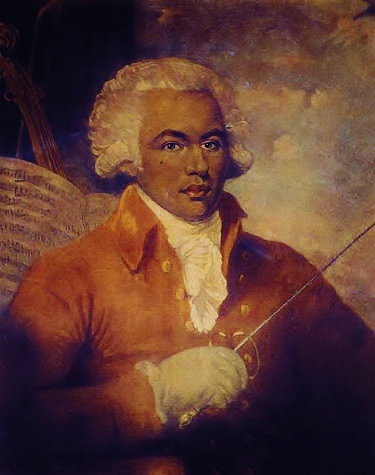
Joseph Bologne, Chevalier de Saint-Georges, was born on Christmas Day in 1745 on the Caribbean archipelago of Guadeloupe. His father was the French plantation owner George de Bologne Saint‐Georges and his mother was the enslaved African woman known as Nanon. In 1748, the young Bologne's father went back to France and brought along not only his wife but Joseph and his mother, Nanon, too. While slaves in Guadeloupe, in France they were considered to be free people.
When he was thirteen years old, Bologne entered the boarding school of the master of arms known as La Boëssière. There he not only studied sword fighting and fencing, but also studied literature, the sciences, and horseback riding. He became extremely skilled at fighting, and in 1765 he was challenged to a fencing duel by the fencer Picard who had mocked him for being Black. Joseph won the duel, and his father rewarded him with a horse and carriage. The following year at age 19, he was made a Gendarme de la Garde du Roi (personal bodyguard to the King) and given the honorary title of chevalier.
At the same time that he was gaining an education at the boarding school, he was also educated in music. It isn't known when he first took up the instruments, but he became a master at the harpsichord and the violin. In 1769 he joined the orchestra Le Concert des Amateurs. This was directed by popular composer of the day, François‐Joseph Gossec. When Gossec left the orchestra in 1773 to direct another group, Bologne was put in his place as director. Bologne debuted as a soloist with this orchestra in 1772, performing one of his own compositions. The music and performance demonstrated to the public that Joseph was a prodigy as both a composer and violinist.
As a young man, Bologne was popular with the ladies, but because he was of mixed race he was never allowed to marry. And while he had the backing of powerful people like the Madame de Montesson (wife of the Duke of Orléans) and Queen Marie Antoinette, it was his race that kept him from becoming the director of the Paris Opera in 1776. A group of four of the women in the opera company had petitioned the Queen to keep them from "‘degrading their honour and delicate conscience by having them submit to the orders of a mulatto."
Most of the music that Bologne composed was published between the years 1773 and 1779. He wrote string quartets, violin concerti, a harp concerto, several symphonie concertante, and much more. Later he dedicated himself to writing operas, and Madame de Montesson hired him as the director of her private theater and also made him the Lieutenant de chasse of her husband's hunting estate. He lost these positions when the Duke died in 1785.
In 1787 he was invited by another fencing master to go to London to participate in exhibition fencing matches. While there, he was seen by the Princes of Wales, who commissioned a portrait of Bologne to be painted by the artist Mather Brown of Boston.
When the French Revolution began in 1789, Bologne took part as a revolutionary by first joining the National Guard. Three years later, he organized the Légion Saint-Georges, a group of people of color who were living in France. This group fought in Belgium against the forces of Austrian and French Royalists. He had as his second in command Thomas Alexandre Dumas, the father of the author of The Three Muskateers. Alas, his military career ended with him in jail for a year and a half over trumped up charges that had to do with his past relationship with the nobility.
After his release from jail, Bologne sailed to Saint-Domingue (present day Haiti), which was in the midst of slave-led revolution. Accompanied by 15,000 troops, he led the charge to abolish slavery there. He then returned to Paris, where he put together a new orchestra to direct, Le Cercle de l'Harmonie. However he fell ill with a serious ailment and was dead at age 53 in June of 1799.
Books for Revolutionary Music Fans: Le Chevalier de Saint-Georges
Throughout 2024, the Boston Public Library is highlighting revolutionary musicians throughout history. In February, we celebrate the legacy of Chevalier de Saint-George, an 18th-century classical composer who achieved widespread acclaim due to his background as a biracial free man of color, violinist, fencer, and soldier. This list of fiction and nonfiction books will appeal to his fans, both new and old.
Books
The Chevalier De Saint-Georges


Add a comment to: Joseph Bologne, Chevalier de Saint-Georges